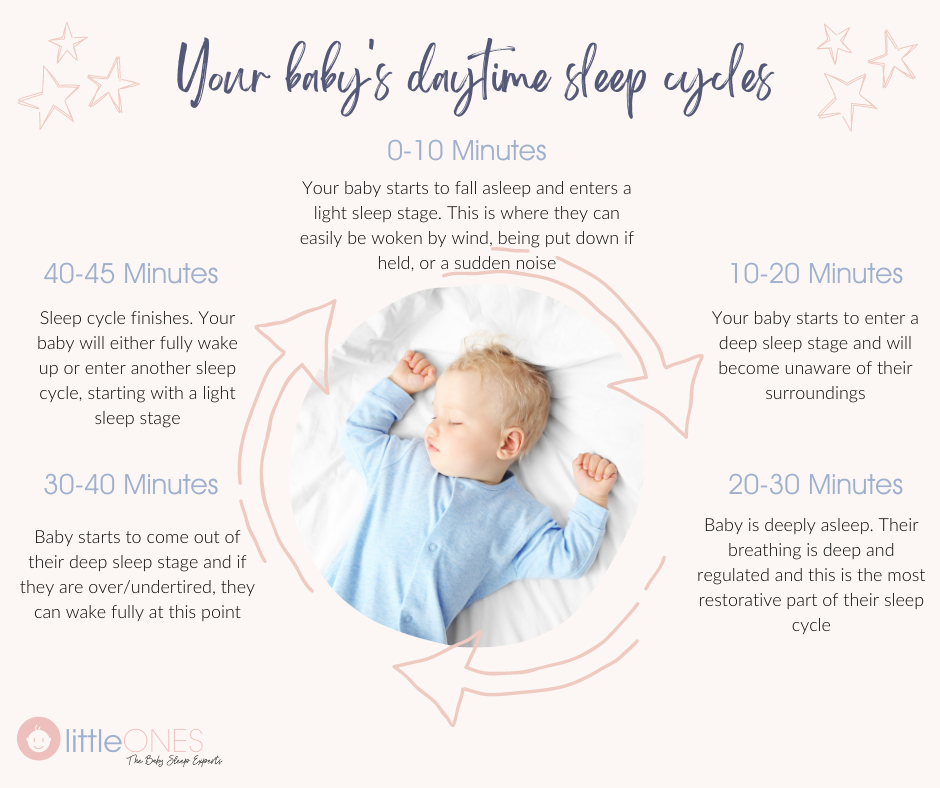
Naps in a nutshell...
We all know that babies (and toddlers) need naps, however sometimes the importance of these day sleeps isn't stressed enough, nor is it emphasised how it can affect your baby's development and behaviour if they are not getting enough sleep at the most beneficial times.
In a nutshell, babies who don’t nap very well can become very hard to settle. You will already know that tired or overtired babies cry more, are fussy when feeding, resist settling and always have an extended unsettled period in the early evening that can last for hours at a time.
Watch: Why won't my baby nap?
As our video mentions, it all comes down to the length and timing of your baby's naps and this is all very age-specific. The way your baby sleeps during their daytime cycles (see the chart below) is crucial to understanding how their napping affects their development.
Right from newborn up until around 2.5-3 years of age, we believe it is vital to establish and maintain a long restorative nap of approximately 2 hours across the middle of the day when there is a natural dip in energy levels. (Obviously, age-dependent, your baby will be having other naps on either side of this lunchtime sleep).
Feeling confused about your baby's sleep needs?
Let our sleep experts help you every step of the way. Together we can solve your little one's sleep challenges
Choose your Sleep Solution
Our reason for aiming for this long consistent nap is that during restorative sleep, babies enter REM and this is where a whole lot of amazing stuff happens! Including - the regulation of their appetite and emotions, reduction of stress and cortisol levels, the consolidation of new skills and memories, their immune system is boosted, brain connections are made and strengthened.
But, we know it can sometimes be hard to get your baby sleeping longer than 45 minutes in a nap though, for a whole host of reasons; all of which are addressed in our Sleep Programs. This chart shows how a baby's daytime sleep cycle works:

In an analogy we can relate to, you might recall days at school or university or being in a business meeting and you're really really tired... You sit there in a daze and it's virtually impossible to comprehend or take in the information being flung at you! Couple that with the feeling like you simply can't operate or communicate on any "normal" level and this is what it's like for your baby when they're not napping well and are overtired. Babies can't rely on a shot of coffee to get through their day!
It can be really tricky to get your baby's napping right and some babies, it seems, are just bad nappers! Have a read of our other nap article for a few more ways to encourage your baby to nap better. We have the answers and all the information you need to get your baby's naps and their development on track and it's right at your fingertips in our Sleep Programs.
---------------
Bibliography
Horváth, Klára, and Kim Plunkett. “Frequent daytime naps predict vocabulary growth in early childhood.” Journal of child psychology and psychiatry, and allied disciplines vol. 57,9 (2016): 1008-17. doi:10.1111/jcpp.12583
Tham, Elaine Kh et al. “Infant sleep and its relation with cognition and growth: a narrative review.” Nature and science of sleep vol. 9 135-149. 15 May. 2017, doi:10.2147/NSS.S125992
Tarullo, Amanda R et al. “Sleep and Infant Learning.” Infant and child development vol. 20,1 (2011): 35-46. doi:10.1002/icd.685
Grigg-Damberger, Madeleine M, and Kathy M Wolfe. “Infants Sleep for Brain.” Journal of clinical sleep medicine : JCSM : official publication of the American Academy of Sleep Medicine vol. 13,11 1233-1234. 15 Nov. 2017, doi:10.5664/jcsm.6786

Receive product and services updates, promotional offers and other marketing communications based.





